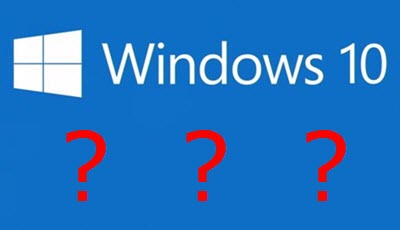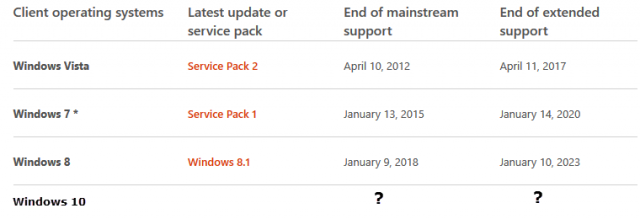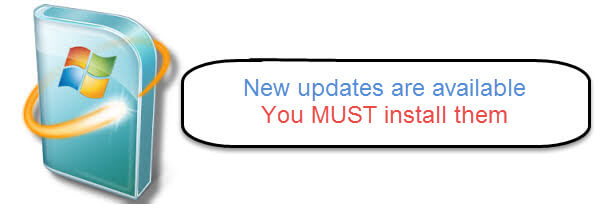With the release of its latest operating system, Microsoft is moving into a whole new era of Windows. “Windows as a service” is the term being bandied about by the company but what does that actually mean? To date, Microsoft’s announcements regarding the ‘Windows as a service’ concept have caused more confusion than clarity.
What is Windows 10’s Support Lifecycle?
Gone is the traditional support lifecycle – 5 years mainstream plus a further 5 years extended – and replaced with what? Microsoft has stated that Windows 10 will be the last Windows operating system, does that mean users can keep using it fully supported and free forever? I seriously doubt it. Fact is, Microsoft has revealed zero information about its Windows 10 support policy to date.
Mainstream Support for Windows 7 and Windows 8 will end in January 2015 and 2018 respectively, while Extended Support will end in January 2020 and 2023 respectively. Obviously, the traditional 10-year support lifecycle is inconsistent with the entire “Windows as a service” concept but some sort of information regarding Windows 10 support would surely be most welcome.
What is the “Lifetime of the device”?
Microsoft has said that the free Windows 10 upgrade will include support for “the lifetime of the device”, yet has failed to clearly define either “lifetime” or “device”. On older devices, this time frame could mean anything from tomorrow to years. And what happens when a motherboard or some other major component is replaced in a PC that’s been upgraded to Windows 10, would that be considered a new device? At the moment, it is not clear if Windows 10 can be re-activated on an upgraded device or if customers would then need to purchase a license.
Microsoft uses an algorithm based on a combination of components and frequency of upgrades to determine whether or not an upgraded PC should be classified as “new”. However, we have no information as to the circumstances when Microsoft could decide your upgraded PC is now a new PC and you have to pay to keep using Windows 10. It may involve something as simple as a call to Microsoft support – the point is, nobody knows.
What are the Repercussions of Forced Updates?
Firstly, a brief explanation of update policies pertaining to the various editions:
- Windows 10 Home users – have no way of bypassing any updates
- Windows 10 Pro users – can delay updates for up to 8 months but not prevent them indefinitely
- Windows 10 Enterprise users – are the only ones who can disallow updates indefinitely
Microsoft has yet to provide any clues that it may rescind the decision to make automatic updates mandatory in Windows 10 prior to the final release. In fact, a clause in the EULA associated with the latest build (RTM) appears to confirm that a change of heart is unlikely:
The Software periodically checks for system and app updates, and downloads and installs them for you. You may obtain updates only from Microsoft or authorized sources, and Microsoft may need to update your system to provide you with those updates.
By accepting this agreement, you agree to receive these types of automatic updates without any additional notice.
The argument that forced updates is the best method to ensure the safety of less experienced users is in itself an oxymoron – if a user does not have enough nous to keep their system up-to-date by themselves, chances are they would also have very little to no clue on how or where to change default “automatic update” settings anyway.
Common sense should be allowed to dictate – when I set up a computer for a client who I know is not overly computer savvy, I will always enable automatic updates. However, on my own machines, no way! It’s all about choice.
If Microsoft is intent on forcing automatic updates, it begs the question: Should Microsoft be held accountable if an update breaks systems or renders them unusable?
This sort of scenario has happened in the past, where a particular update has caused widespread serious issues. If Microsoft is prepared to “force” users to apply all updates, should the company not also be held responsible for any detrimental consequences? I’m pretty certain that if a large corporation suffered loss of income due to an errant update crashing its computer systems, a major lawsuit would ensue. However, Microsoft has countered this eventuality by allowing premium ‘Windows 10 Enterprise’ users to disallow updates indefinitely, thereby reducing Home users to the role of guinea pig. In fact, Microsoft openly admitted this in a blog post entitled “Windows 10 for Enterprise: More secure and up to date“:
By the time Current branch for Business machines are updated, the changes will have been validated by millions of Insiders, consumers and customers’ internal test processes for several months, allowing updates to be deployed with this increased assurance of validation. <source>
I’m guessing that 3rd party methods for bypassing updates will make an appearance sooner or later but this only poses yet a further question: What will happen to users who try to prevent updates installing?
Microsoft has provided a clue as to the consequences for business users who fail to install certain updates within the required 8 months period:
Customers who are embracing Current Branch for Business do need to consume that feature update within the allotted time period of approximately eight months or they will not be able to see and consume the next security update.
One can only assume a similar fate would befall Home users who block updates by “other” means. However, given that impediments such as long vacations or ISP data caps are likely to delay updates and risk detrimental consequences, do users not have the right to know exactly how this is all going to play out?
Bottom Line
I cannot recall a previous new operating system pre-launch campaign where Microsoft has been so vague and ambiguous as with this one. As consumers we should be provided with enough information to know exactly where we stand before we sign up, not after. I have no doubt many ardent Windows users will happily upgrade to Windows 10 and accept whatever comes along, however, I suspect the majority of more experienced users might play a game of wait and see.
It didn’t and shouldn’t need to be like that, a little transparency goes a long way.





Now post this article on the Windows Insider blog. I do believe automatic driver installs will make a lot of unhappy users, especially if users are running a dedicated graphics card, like I do.
I guess all the Nerds at MS are the only ones smart enough to maintain Windows. It is like saying I’m an idiot MS please install my updates.
The forced update risks are beautifully explained in the article, thank you Jim. I for one will not migrate to Win 10 for the very reasons you so clearly outlined. I do not want to be a guinea pig for MS, and have my computer “bricked” without some recourse against MS. On top of that, I pay by the MB for internet, and downloading updates for software I don’t use, really bothers me. For instance, I have Office 2010 on my machine, but do not use Outlook, yet MS wants to continuously download updates for it. When Win 8.1 has exceeded its support cycle, I will switch to Mac if MS has not modified it’sposition.
I have Windows 7. I am of the same mind as Ralph C. on both counts, the only caveat being that I reserve the right to not wait until the end of the Windows 7 cycle to switch to Mac.
Hi Jim,
Thanks for the updated info.
Yes, the Home version of Windows 10 will force updates under M/S control, and after reading the information at http://www.ghacks.net relating to the purchased Pro version of Windows 10, with which users can control updates, but there is a catch, stating that serious consequences will occur if updates are not installed within eight months.
Interesting to see if it happens, purchasing a product, then being dictated to what you will do with updates.
Regards,
JoninOz
I just updated one of our windows 8 computers. It took a little while as it hadn’t been conected with the internet for a ‘few’ (7) months.
It worked for what it was used for without problems and being ‘secure’ from outside hacking didn’t need updating.
I wonder how microsoft will get around this ‘problem’.
An elderly aunt lives in north California and has SLOW dial up as the only available connection. It takes her literally hours to get her anti-virus updates and she can just about manage to email. Is her computer – a later one with 10 – going to be unusable for days while windows updates?
Linux looks more and more viable as microsoft get weirder and more controling.
I have the free Windows 10 “reserved”, but I have just discovered (& installed) Ubuntu Linux, which dual boots alongside Windows 7 Home Premium. Ubuntu IS more complex than Windows (you have to do a lot of stuff in command line mode), but I’m no dummy, I can learn Ubuntu, & I’m SERIOUSLY considering cancelling the free Windows 10 !!
These questions have been answered by Microsoft in the publication of their EULA. Your post is three days behind the rest of the world.
Okay, so what are the answers then??
Are you running Windows 10 RTM, have you even seen the EULA? I am, and I have.
In the W10 Eula, retail version transfers are the same as with W7 and W8.1. OEM downgrades will have to be within the 10yr lifespan of W7 and W8.1.
Now here is the one that is hard to swallow. W10 will deliver automatic updates without users being able to delay or reject updates on consumers and small business PC’s. By accepting this agreement, you agree to receive these types of automatic updates without any additional notice. Their is more.
My W7 is a retail version, do I get a retail version of W10 if I take the free upgrade?
…and the crickets continue chirping.
I don’t like the fact that ALL updates MUST be implemented! At least with Windows 8.1, I can opt out of non security updates that I don’t need. Thus, I’m opting out of Windows 10 unless and until Microsoft gets some sense knocked into them regarding this! There WILL be serious issues regarding this, of that I am certain!
I don’t mind being behind the rest of the world Alan. I follow Dave, Jim, Marc and the rest of the team and their top advice which is very reliable, more than Microsoft in many instances, faulty updates for one.